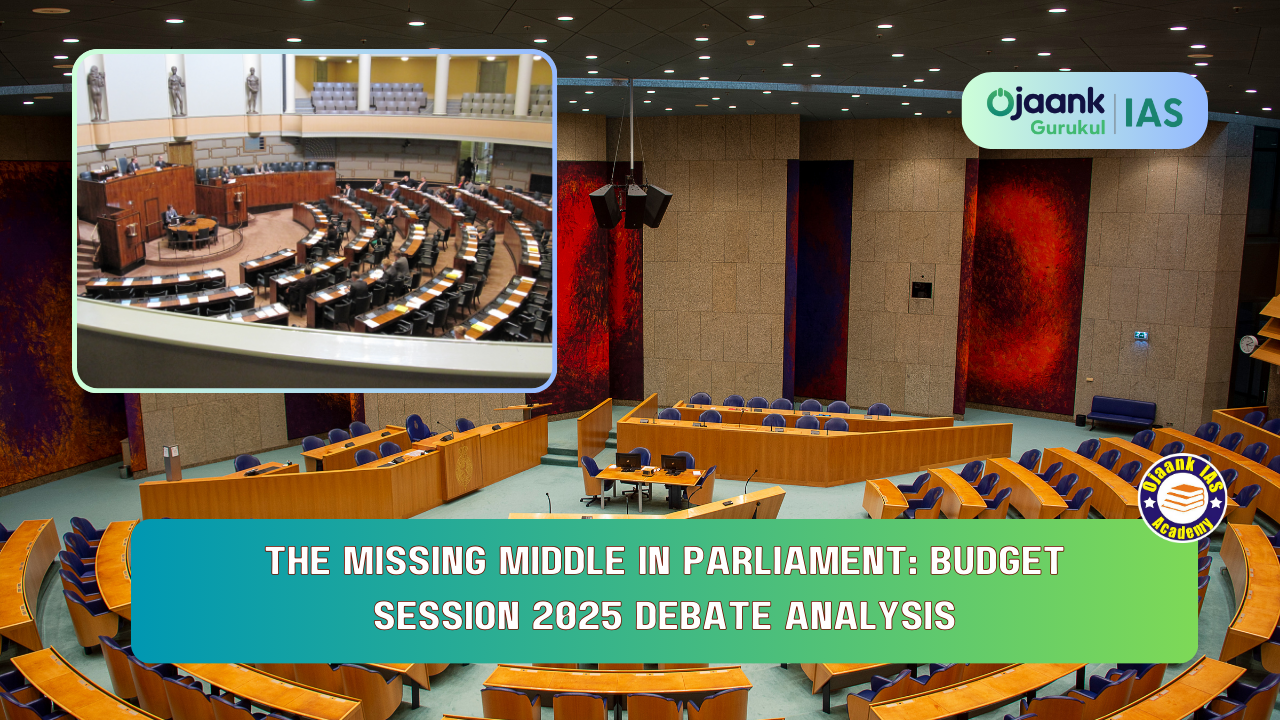The Missing Middle in Parliament: Budget Session 2025 Debate Analysis

Introduction
The 2025 Budget Session of the Indian Parliament was anything but ordinary. With legislative marathons stretching past midnight and fiery debates on polarizing issues, it became a snapshot of India’s fractured political ecosystem. While the ruling BJP celebrated procedural wins and a productive session on paper, the deeper narrative revealed a disturbing reality — India’s Parliament is missing its middle ground. Bipartisan cooperation, once the cornerstone of Indian legislative functioning, is now nearly extinct.
Midnight Oil and Majoritarian Moves: What Really Happened?
The headline legislation of the session — the Waqf (Amendment) Bill 2025 — became a lightning rod for controversy. Though passed after prolonged deliberations, its journey underscored the increasing divide across party lines and between communities. The debates were robust and at times constructive, but what stood out was not consensus — it was division.
Yes, the Bill was cleared with support from allies, but crucially, no Muslim MP supported the amendments, save a nominated Rajya Sabha member. The legislation’s passage without engaging the very community it directly impacts is more than just bad optics; it’s a textbook example of majoritarianism in action.
Unity in Opposition, But Fragile Faultlines in Alliances
The Opposition showed surprising cohesion. Despite previous cracks, constituents stood united, occasionally even winning over neutral players. Yet, the BJP’s grip on the legislative agenda remained firm.
However, the real tremors were felt in the BJP’s own backyard. The Biju Janata Dal (BJD) faced internal dissent for not issuing a whip against the Waqf Bill, in contradiction to its own leader Naveen Patnaik’s anti-Bill stance. Similarly, the AIADMK voting against the Bill signaled its unease with BJP's policies—echoing the reasons behind their 2023 fallout. The regional player fears losing its minority voter base, a demographic crucial to its political survival.
On the flip side, the JD(U) and TDP showed no such hesitation, choosing alignment over autonomy in their alliance with the BJP. But this uncritical embrace could come at a long-term cost, especially in a polity demanding nuanced, inclusive governance.
President’s Rule in Manipur: Midnight Drama, Minimal Consensus
Another midnight debate surrounded the imposition of President’s Rule in Manipur. While the move was eventually approved, it wasn’t devoid of contention. Though the Opposition was granted space to articulate concerns, the air was thick with unease, stemming from the Centre’s approach to handling regional crises without collaborative federal consultation.
Procedural Wins ≠ Democratic Health
Sure, the session was productive by traditional metrics — Bills passed, debates held, and sessions extended. But democracy isn’t just about passing laws; it’s about inclusive governance. The fact that a bill like the Waqf Amendment was passed without any meaningful input from the Muslim community, or support from their representatives, shows a serious trust deficit.
And if you peel back the curtain, there’s more discord brewing. Rajya Sabha Chairman Jagdeep Dhankhar walking out of a committee meeting, and the ongoing tussle between Rahul Gandhi and Lok Sabha Speaker Om Birla over speaking time, underline how institutional decorum is fraying.
The Missing Middle: Why It Matters
Democracies thrive when there's room for compromise, negotiation, and dialogue — the "missing middle" that now seems absent in Indian Parliament. Instead of building bridges, Parliament is witnessing hardened silos, where legislation is either bulldozed through or stonewalled altogether. This session could have been a chance to create common ground, to rebuild democratic trust. Instead, it sharpened existing polarizations.
Final Thoughts: What Should Worry Us All
The 2025 Budget Session will be remembered for more than just its late hours and legislative hustle. It reflects a dangerous shift toward performative politics, where debates are for soundbites and legislation for political one-upmanship. With critical communities feeling left out and alliances cracking under the surface, the road ahead demands a reset — a return to true bipartisan dialogue.
If Parliament is the temple of democracy, then the "missing middle" is the ghost haunting its halls. Without it, we risk turning this sacred institution into just another battlefield.